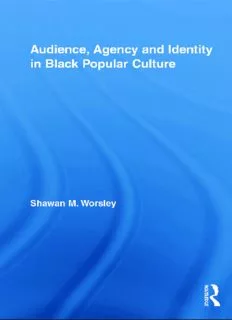
Audience, Agency and Identity in Black Popular Culture (Studies in African American History and Culture) PDF
Preview Audience, Agency and Identity in Black Popular Culture (Studies in African American History and Culture)
Audience, Agency and Identity in Black Popular Culture Studies in African American History and Culture GRAHAM HODGES, General Editor New York’s Black Regiments During Slavery in the Cherokee Nation the Civil War The Keetoowah Society and the William Seraile Defi ning of a People 1855–1867 Patrick N. Minges Jesuit Slaveholding in Maryland, 1717–1838 Troubling Beginnings Thomas Murphy, S.J. Trans(per)forming African American History and Identity “White” Americans in “Black” Africa Maurice E. Stevens Black and White American Methodist Missionaries in Liberia, 1820–1875 The Social Teachings of the Eunjin Park Progressive National Baptist Convention, Inc., Since 1961 The Origins of the African American A Critical Analysis of the Least, the Civil Rights Movement, 1865–1956 Lost, and the Left-out Aimin Zhang Albert A. Avant, Jr. Religiosity, Cosmology, and Folklore Giving a Voice to the Voiceless The African Infl uence in the Novels of Four Pioneering Black Women Toni Morrison Journalists Therese E. Higgins Jinx Coleman Broussard Something Better for Our Children Constructing Belonging Black Organizing in Chicago Public Class, Race, and Harlem’s Schools, 1963–1971 Professional Workers Dionne Danns Sabiyha Prince Teach the Nation Contesting the Terrain of the Public School, Racial Uplift, and Ivory Tower Women’s Writing in the 1890s Spiritual Leadership of African- Anne-Elizabeth Murdy American Women in the Academy Rochelle Garner The Art of the Black Essay From Meditation to Transcendence Post-Soul Black Cinema Cheryl B. Butler Discontinuities, Innovations, and Breakpoints, 1970–1995 Emerging Afrikan Survivals William R. Grant, IV An Afrocentric Critical Theory Kamau Kemayó The Mysterious Voodoo Queen, When to Stop the Cheering? Marie Laveaux The Black Press, the Black A Study of Powerful Female Community, and the Integration of Leadership in Nineteenth-Century Professional Baseball New Orleans Brian Carroll Ina Johanna Fandrich The Rise and Fall of the Garvey Race and Masculinity in Movement in the Urban South, Contemporary American 1918–1942 Prison Narratives Claudrena N. Harold Auli Ek The Black Panthers in the Midwest Swinging the Vernacular The Community Programs and Jazz and African American Services of the Black Panther Party Modernist Literature in Milwaukee, 1966–1977 Michael Borshuk Andrew Witt Boys, Boyz, Bois Words and Songs of Bessie Smith, An Ethics of Black Masculinity in Billie Holiday, and Nina Simone Film and Popular Media Sound Motion, Blues Spirit, and Keith M. Harris African Memory Melanie E. Bratcher Movement Matters American Antiapartheid Activism and Blaxploitation Films of the 1970s the Rise of Multicultural Politics Blackness and Genre David L. Hostetter Novotny Lawrence Slavery, Southern Culture, and Womanism, Literature, and the Education in Little Dixie, Missouri, Transformation of the Black 1820–1860 Community, 1965–1980 Jeffrey C. Stone Kalenda Eaton Courting Communities Racial Discourse and Black Female Nationali sm and Cosmopolitanism in Twentieth- “Syncre-Nationalism” in the Century African American Writing Nineteenth-Century North Tania Friedel Kathy L. Glass Audience, Agency and Identity in The Selling of Civil Rights Black Popular Culture The Student Nonviolent Shawan M. Worsley Coordinating Committee and the Use of Public Relations Vanessa Murphree Black Liberation in the Midwest The Struggle in St. Louis, Missouri, 1964–1970 Kenneth S. Jolly Audience, Agency and Identity in Black Popular Culture Shawan M. Worsley New York London First published 2010 by Routledge 270 Madison Ave, New York, NY 10016 Simultaneously published in the UK by Routledge 2 Park Square, Milton Park, Abingdon, Oxon OX14 4RN Routledge is an imprint of the Taylor & Francis Group, an informa business This edition published in the Taylor & Francis e-Library, 2009. To purchase your own copy of this or any of Taylor & Francis or Routledge’s collection of thousands of eBooks please go to www.eBookstore.tandf.co.uk. © 2010 Shawan M. Worsley All rights reserved. No part of this book may be reprinted or reproduced or utilised in any form or by any electronic, mechanical, or other means, now known or hereaf- ter invented, including photocopying and recording, or in any information storage or retrieval system, without permission in writing from the publishers. Trademark Notice: Product or corporate names may be trademarks or registered trade- marks, and are used only for identification and explanation without intent to infringe. Library of Congress Cataloging in Publication Data Worsley, Shawan M. Audience, agency and identity in Black popular culture / by Shawan M. Worsley. p. cm.—(Studies in African American history and culture) Includes bibliographical references and index. 1. African Americans in popular culture—History—20th century. 2. African- American arts—20th century. 3. African Americans—Intellectual life—20th century. 4. African Am ericans—Race identity. 5. Racism in popular culture— United States—History—20th century. 6. Stereotypes (Social psychology)—United States. 7. Hip-hop—Social aspects—United States. 8. Rap (Music)—Social aspects—United States. 9. Popular culture—United States—History—20th century. I. Title. E185.625.W624 2009 305.896'07300904—dc22 2009018163 ISBN 0-203-86657-6 Master e-book ISBN ISBN10: 0-415-80486-8 (hbk) ISBN10: 0-203-86657-6 (ebk) ISBN13: 978-0-415-80486-8 (hbk) ISBN13: 978-0-203-86657-3 (ebk) This book is dedicated to my husband Marcus Andre Worsley. Contents List of Illustrations xiii Acknowledgments xv 1 Race, Racism and Black Popular Culture 1 Introducing the Examples 1 Racial Politics and Black Popular Culture 4 Black Cultural Traditions and Racist Appropriations 6 Conclusion 8 2 Making the Past Accountable: The Wind Done Gone and Stereotypes of Black Women 10 The Rationale for The Wind Done Gone 11 Ambivalence and Agency in Black Female Sexuality 14 Why Cynara Is Not a Heroic Black Female Slave 18 Randall’s Strategic Engagement of Stereotypes 21 The Wind Done Gone and the Contemporary Narrative of Slavery 24 Conclusion 27 3 Audience Reception through the Lens of a $10 Million Dollar Lawsuit 29 The Battle Over Representations 30 Does Gone With the Wind’s Racist Imagery Matter? 32 Should Racist Copyrighted Texts Be Protected? 34 The Effectiveness of Randall’s Appropriations 35 An Overall Assessment of The Wind Done Gone 36 Conclusion 40
Description: